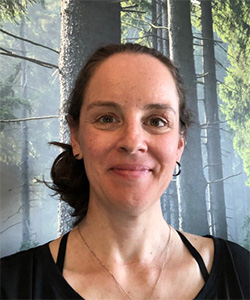Science: an array of opportunities

By: Geneviève Bélanger, Acting Associate Director, Quebec
I was born in Miguasha, a small village in the Gaspé Peninsula. This coastal region of Quebec is traversed by many rivers. I’ve always been interested in science, especially the natural sciences. When I was a young adult, I toyed with the idea of studying astrophysics. However, I quickly found out that having a keen interest in extra-planetary phenomena is one thing but having a knack for abstract physical concepts is quite another! I continued to contemplate the stars, but I turned toward to the more concrete science of biology and the fascinating world of the interconnection between ecosystems and animal behaviour, particularly fish movement behaviours. Don’t forget that I come from a coastal region traversed by many rivers!
I hold a bachelor’s degree in biology with specialization in wildlife management and a master’s degree in wildlife and habitat management, both from the Université du Québec à Rimouski. My master’s research project explored the movements of brook trout and juvenile salmon in waterways and their capacity for attachment to a particular site. Have you ever tracked fish with fluorescent tags while snorkelling in a river at night with an ultraviolet flashlight? Well, I have! In fact, I published two scientific articles based on these studies.
After completing my master’s degree in wildlife and habitat management, I worked on research projects on the movements of Atlantic Salmon in the context of hydroelectric development projects (more snorkelling with fish!) and on the recolonization of logging areas by ruffed and spruce grouse. I then worked for Fisheries and Oceans Canada for most of my career as a biologist in the fisheries protection program where I played a variety of roles: educating and informing the public; project assessment; and checking conformity with authorizations under the Fisheries Act as a protection officer. I started working in environmental assessment at Agriculture and Agri-Food Canada before coming to the Impact Assessment Agency of Canada where I have worked for nearly eight years now.
I came to the Agency in 2014 as an environmental assessment analyst. I worked next as a project manager from 2015 to 2019 and then as a team leader from 2020 onward. I have held the position of Acting Associate Director of the Quebec Regional Office, which is located in the traditional territory of the Huron-Wendat people, since September 2021. As Associate Director, I support the Quebec Regional Office primarily with its corporate files. I am involved in the planning and coordination of financial and human resources so that our team can fulfill its mandate and deliver high-quality impact assessments.
I also represent the Quebec Regional Office with various external partners in matters of environmental assessment, more specifically, in connection with the regional assessment of the St. Lawrence River conducted by the Agency in collaboration with the Government of Quebec and with the Transport Canada pilot project on the cumulative effects of marine activities in the St. Lawrence River. I am involved in the implementation of the James Bay and Northern Quebec Agreement as a member and Executive Secretary of three committees responsible for the repercussions of projects on the environment and the social milieu of Cree and Inuit communities.
What motivates me the most about my work is understanding and solving problems with the help of various sources of information and expertise and then explaining or popularizing the findings. I believe that’s why I like working at the Agency so much, since we need to summarize scientific, often very detailed information and explain in clear and simple terms what the various impacts of a project are to First Nations peoples, decision-makers and the general public. Conducting a thorough environmental assessment requires knowledge and an understanding of a broad variety of principles and scientific concepts ranging from atmospheric sciences and hydrogeology to soil contamination and bird behaviour, or even the reproductive cycle of fish! Working at the Agency means we are continually broadening our horizons and improving our knowledge since we are regularly confronted with new environmental issues.
Studying science offers a wide array of possibilities because of the many and varied fields. Studying science allowed me to develop a greater understanding of our environment and the place of human beings in it, but more particularly, to develop my critical thinking skills and ability to analyze problems and situations. My career in science allows me to put my knowledge to use for the good of society by improving protection of the environment.
Page details
- Date modified: